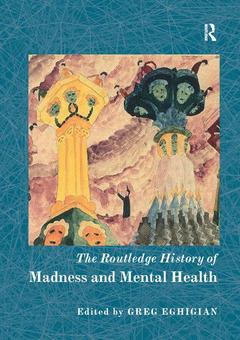Description
The Routledge History of Madness and Mental Health
Routledge Histories Series
Coordinator: Eghigian Greg
Language: English
Subject for The Routledge History of Madness and Mental Health:
Keywords
American Psychiatric Association; Psychotic Symptoms Rating Scale; Akihito Suzuki; Insulin Coma Therapy; Andreas Killen; Mental Illness; Andrew Scull; Young Man; BenoMajerus; Worcester State Hospital; Chiara Thumiger; Good Life; Claire Trenery; Ect; Elizabeth Mellyn; Somatic Treatment; Geoffrey Reaume; Colonial Psychiatry; German E; Berrios; Mad Person; Ilya Vinitsky; Descriptive Psychopathology; Ivana S; Markov; Nineteenth Century Asylums; Jesse Ballenger; Nineteenth Century Psychiatry; Jonathan Sadowsky; Latin American Psychiatry; Laura Hirshbein; Mad People; Madalina Vartejanu-Joubert; Vincent Van Gogh; Manuella Meyer; De La Cour; Peregrine Horden; Nineteenth Century Cape Colony; Rhodri Hayward; Petteri Pietikainen; Richard Noll; Mad Houses; Sally Swartz; Soren Kierkegaard; Sonu Shamdasani; Malaria Fever Therapy; Toine Pieters; Spiritual Physic; Waltraud Ernst; Graeco Roman Medicine
Publication date: 12-2019
· 17.4x24.6 cm · Paperback
Publication date: 04-2017
· 17.4x24.6 cm · Hardback
Description
/li>Contents
/li>Readership
/li>Biography
/li>
The Routledge History of Madness and Mental Health explores the history and historiography of madness from the ancient and medieval worlds to the present day. Global in scope, it includes case studies from Africa, Asia, and South America as well as Europe and North America, drawing together the latest scholarship and source material in this growing field and allowing for fresh comparisons to be made across time and space.
Thematically organised and written by leading academics, chapters discuss broad topics such as the representation of madness in literature and the visual arts, the material culture of madness, the perpetual difficulty of creating a classification system for madness and mental health, madness within life histories, the increased globalisation of knowledge and treatment practices, and the persistence of spiritual and supernatural conceptualisations of experiences associated with madness. This volume also examines the challenges involved in analysing primary sources in this area and how key themes such as class, gender, and race have influenced the treatment and diagnosis of madness throughout history.
Chronologically and geographically wide-ranging, and providing a fascinating overview of the current state of the field, this is essential reading for all students of the history of madness, mental health, psychiatry, and medicine.
List of figures
List of contributors
Introduction to the history of madness and mental health
Greg Eghigian
Part I. Madness in the ancient and medieval worlds
1. Representations of madmen and madness in Jewish sources from the pre-exilic to the
Roman-Byzantine period
Madalina Vartejanu-Joubert
2. Ancient Greek and Roman traditions
Chiara Thumiger
3. Madness in the Middle Ages
Claire Trenery and Peregrine Horden
Part II. Professions, institutions, and tools
4. Healers and healing in the early modern health care market
Elizabeth Mellyn
5. The asylum, hospital, and clinic
Andrew Scull
6. The epistemology and classification of 'madness' since the eighteenth century
German E. Berrios and Ivana Marková
Part III. Beyond medicine
7. Psychiatry and religion
Rhodri Hayward
8. Madness in Western literature and the arts
Ilya Vinitsky
9. Psychiatry and its visual culture, c. 1800–1960
Andreas Killen
Part IV. Global dimensions, colonial and post-colonial settings
10. Madness and psychiatry in Latin America’s long nineteenth century
Manuella Meyer
11. Histories of madness in South Asia
Waltraud Ernst
12. Mad Africa
Sally Swartz
13. Voices of madness in Japan: narrative devices at the psychiatric bedside and in
modern literature
Akihito Suzuki
Part V. Perspectives and experiences
14. The straightjacket, the bed, and the pill: material culture and madness
Benoît Majerus
15. From the perspectives of mad people
Geoffrey Reaume
16. Dementia: confusion at the borderlands of aging and madness
Jesse Ballenger
Part VI. Maladies, disorders, and treatments
17. Passions and moods
Laura Hirshbein
18. Psychosis
Richard Noll
19. Somatic treatments
Jonathan Sadowsky
20. Psychotherapy in society: historical reflections
Sonu Shamdasani
21. The antidepressant era revisited: towards differentiation and patient-
empowerment in diagnosis and treatment
Toine Pieters
Index
Greg Eghigian is Associate Professor of Modern History at Penn State University. His most recent book is The Corrigible and the Incorrigible: Science, Medicine, and the Convict in Twentieth-Century Germany (2015). He is presently writing a book on the history of the UFO phenomenon.




